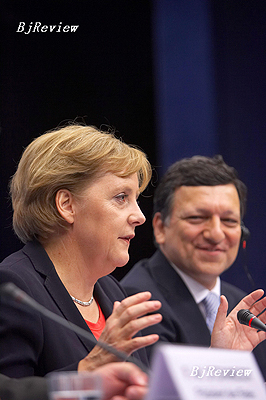
On June 23, after a protracted summit in Brussels, the European Union (EU)'s widely scrutinized struggle to devise a Constitution hit a turning point and European leaders reached an agreement to draft a new EU treaty.
The new treaty will replace the defunct EU Constitution, which was rejected by French and Dutch voters two years ago. Details of the new treaty will be discussed by representatives of the member states before the end of this year, under the Portuguese EU presidency, which kicked off on July 1. After ratification by member states, the new treaty is expected to come into force before June 2009 when the election of a new European Parliament is scheduled. So the new European Parliament can hopefully be elected under the new treaty, according to Ambassador Serge Abou, Head of the Delegation of the European Commission to China.
"After two years of uncertainty and reflection among our capitals and our peoples, Europe is back on track," commented Abou.
At a recent press conference, the ambassador briefed the media about the main features of the new treaty. He said the new treaty readopted the basic features of the Constitutional Treaty but reduced some of the more "symbolic aspects" that some people disagreed with. For example, a "double majority" voting system will be introduced in 2014, allowing decision-making to be carried out by a 55 percent majority of member states and simultaneously by 65 percent of the EU's total population. A more stable post for president of the European Council, the EU's highest decision-making body, will be set up. Another position will be created, for the EU High Representative for Foreign Affairs and Security Policy, who will also act as vice chairman of the European Commission and chair meetings of EU foreign ministers. The number of European Commissioners will be reduced from 27 to 15, while the power of their president will increase.
Also, the role of the European Parliament and the national Parliaments of member states will be strengthened. In addition, the EU Charter of Fundamental Rights will be incorporated into the treaty to become legally binding to EU member states, except Britain.
"It is true that the treaty is less ambitious than the Constitutional Treaty, but we have taken into account the reaction of our people," said Abou. "It is very substantial progress. It will make the union more united and more efficient."
Feng Zhongping, Director of the Institute of European Studies of the China Institutes of Contemporary International Relations, recalls that the EU has traveled a long path to devise a Constitution. After the idea was first proposed in 2001, a Constitutional Treaty was signed by representatives of its then 25 member states three years later. However, it was vetoed in referendums in France and the Netherlands in May and June 2005 respectively, bringing the process for the EU Constitution to a screeching halt.
However, Feng notes, despite the standoff the EU has maintained its past achievements. To his mind, France's support and Germany's EU presidency in the first half of this year, are mainly responsible for the reviving of the process. It is his belief that a consensus between Germany and France, twin engines of the EU, is essential to the progress of the EU. German Chancellor Angela Merkel has given top priority to formulating a Constitution for Europe since she assumed office in 2005. The newly elected French President Nicolas Sarkozy is in favor of revising the Constitutional Treaty, too.
"The two leaders' convergence of views led to the recent agreement in Brussels," he says.
While believing that the agreement helped end the EU's constitutional crisis, Feng underscores the importance of an EU Constitution. He points out that the current EU institutions and systems are so outdated, given the union's expansion, that they must be redesigned. Also, the EU has realized the need to unify its policy on foreign affairs and security to boost its international influence, now that it has achieved economic integration and a single currency, he notes.
Zhao Junjie, a research fellow at the Institute of Studies under the Chinese Academy of Social Sciences, believes EU member states will be embroiled in fierce contention as they assert their own interests in the second half of the year, when the treaty is formulated. He says Poland is discontent with the voting system, which threatens to severely weaken its voting rights. Also, the Europeans' general attitude toward a future Constitution is still in doubt. Whether the treaty can win recognition from member states, and Poland in particular, is yet to be ascertained.
However, the main principles of European integration will remain unchanged, such as the "double majority" voting mechanism, a common policy on foreign affairs and better protection of the human rights of European citizens.
Abou was ostensibly optimistic, saying the chances to have the treaty adopted were "very strong."
"The objective is to have this treaty adopted and ratified by the 27 member states before June 2009," he told reporters. "We will have half a year to conclude and sign the treaty and have more or less one and a half years to have it ratified by the parliaments or peoples. I am very optimistic about the ratification. France and the Netherlands have decided not to put the treaty to a referendum. Also, the economic and social climate in Europe is far better than it was two years ago." | 